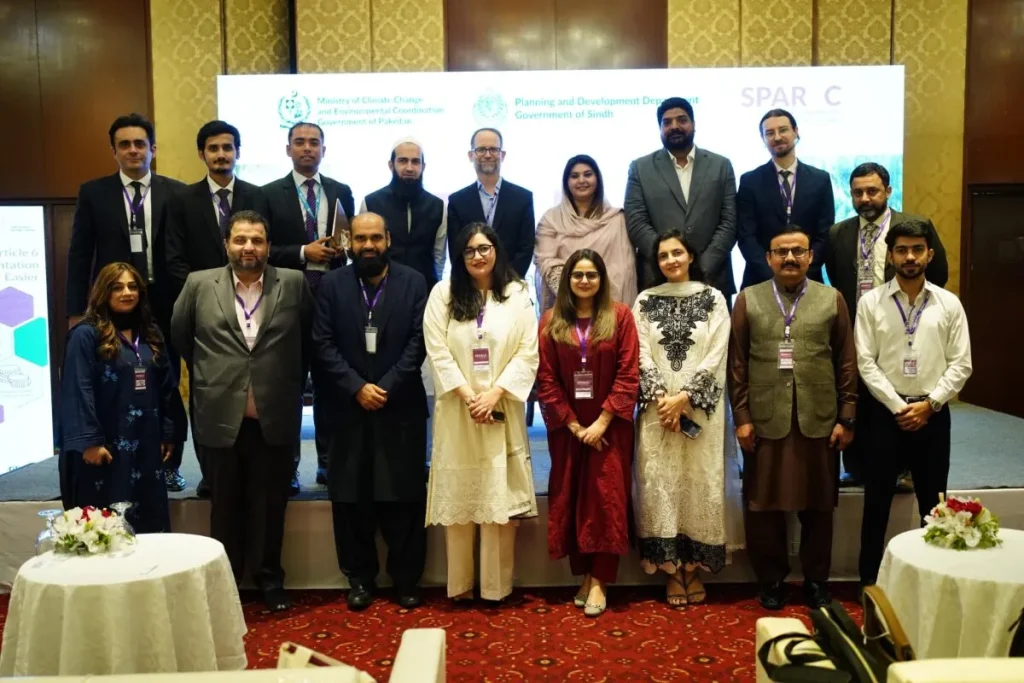Karachi, July 17, 2025 – The Supporting Preparedness for Article 6 Cooperation (SPAR6C) program held a Carbon Market Training Workshop in Karachi, bringing together key stakeholders from across Pakistan. The event, organized with the Ministry of Climate Change & Environmental Coordination (MoCC&EC) and the Sindh Planning and Development Department, aimed to strengthen climate finance and accelerate the country’s path toward a low-carbon economy.
SPAR6C is a five-year initiative funded by Germany’s Federal Ministry for Economic Affairs and Climate Action (BMWK) through the International Climate Initiative (IKI). The Global Green Growth Institute (GGGI) leads the program worldwide, while UNEP-CCC and GFA Consulting Group oversee its implementation in Pakistan. The project builds capacity in Pakistan, Colombia, Thailand, and Zambia to help them engage effectively in carbon markets under Article 6 of the Paris Agreement.
Opening the workshop, Mr. Zubair Ahmed Channa, Secretary of the Environment, Climate Change & Coastal Development Department, stressed the critical role of carbon markets. “Pakistan is at a turning point in its climate journey. Carbon markets are vital to our net-zero ambitions. This workshop strengthens collaboration to mobilize climate finance for sustainable development,” he said. Ms. Nadia Rehman, Member for Climate Change at the Ministry of Planning, Development, and Special Initiatives (MoPDSI), also spoke, reaffirming the government’s commitment to climate action.
The workshop featured international experts who shared their expertise on carbon market mechanisms. Denis Machnik, Senior Advisor at UNEP-CCC, introduced SPAR6C and explained how Pakistan can benefit from Article 6 frameworks. Jonas Hagen, Principal Expert at GFA International, highlighted opportunities in transport, cement, and waste management. Ahsan Kamran, Senior Carbon Markets Consultant, discussed the project lifecycle, including baseline setting, validation, issuance, and transferring internationally transferred mitigation outcomes (ITMOs). Urwah Khan, Advisor on Climate & Energy at UNEP-CCC, explored Pakistan’s readiness for transactions and private sector engagement.
Presentations from Nadia Shafiq, Senior Chief of the Environment & Climate Change Sector at Planning & Development Punjab, and Babar Sahib Din, CEO of Lahore Waste Management Company, focused on Punjab’s green investment potential. They emphasized how waste management projects can use carbon finance to deliver sustainable and scalable climate solutions.
A panel discussion followed, featuring representatives from leading investment banks and financial institutions. The dialogue covered financing models and the integration of carbon finance into investment strategies. Speakers also discussed the role of commercial banks, the State Bank of Pakistan, and development finance institutions in supporting the shift to a low-carbon economy.
SPAR6C plans to continue engaging stakeholders across the country. The program will build technical expertise to navigate carbon markets and help expand low-carbon infrastructure and nature-based solutions for Pakistan’s sustainable future.


